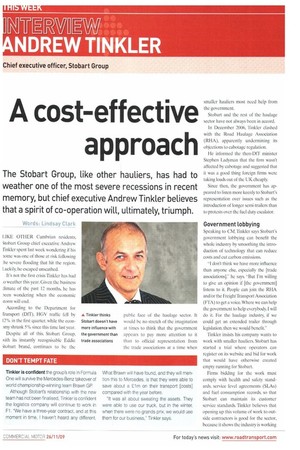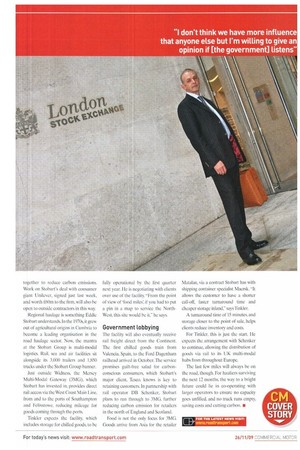A cost-effective approach
Page 18

Page 19

If you've noticed an error in this article please click here to report it so we can fix it.
The Stobart Group, like other hauliers, has had to weather one of the most severe recessions in recent memory, but chief executive Andrew Tinkler believes that a spirit of co-operation will, ultimately, triumph.
vVorob. Lincisay Clark
LIKE OTHER Cumbrian residents. Stobart Group chief executive Andrew Tinkler spent last week wondering if his :wine was one of those at risk following :he severe flooding that hit the region. Luckily, he escaped unscathed.
It's not the first crisis Tinkler has had .o weather this year. Given the business limate of the past 12 months, he has Deen wondering when the economic itorm will end.
According to the Department for fransport (DfT), HGV traffic fell by 12% in the first quarter, while the econ>my shrunk 5% since this time last year.
Despite all of this. Stobart Group, mith its instantly recognisable Eddie 3tobart brand, continues to be the public face of the haulage sector. It would be no stretch of the imagination at times to think that the government appears to pay more attention to it than to official representation from the trade associations at a time when smaller hauliers most need help from the government.
Stobart and the rest of the haulage sector have not always been in accord.
In December 2006, Tinkler clashed with the Road Haulage Association (RHA), apparently undermining its objections to cabotage regulation.
He informed the then-DIE minister Stephen Ladyman that the firm wasn't affected by cabotage and suggested that it was a good thing foreign firms were taking loads out of the UK cheaply.
Since then, the government has appeared to listen more keenly to Stobart's representation over issues such as the introduction of longer semi-trailers than to protests over the fuel duty escalator.
Government lobbying
Speaking to CM "linkler says Stobart's government lobbying can benefit the whole industry by smoothing the introduction of technology that can reduce costs and cut carbon emissions.
"I don't think we have more influence than anyone else, especially the [trade associations]," he says. But I'm willing to give an opinion if [the government] listens to it. People can join the RHA and/or the Freight Transport Association (FTA) to get a voice. Where we can help the government to help everybody, I will do it. For the haulage industry, if we could get an extended trailer through legislation, then we would benefit."
Tinkler insists his company wants to work with smaller hauliers. Stobart has started a trial where operators can register on its website and bid for work that would have otherwise created empty running for Stobart.
Finns bidding for the work must comply with health and safety standards, service level agreements (SLAs) and fuel consumption records, so that Stobart can maintain its customer service standards. Tinkler believes that opening up this volume of work to outside contractors is good for the sector, because it shows the industry is working
together to reduce carbon emissions. Work on Stobart's deal with consumer giant Unilever, signed just last week, and worth £60m to the firm, will also be open to outside contractors in this way.
Regional haulage is something Eddie Stobart understands. In the 1970s, it grew out of agricultural origins in Cumbria to become a leading organisation in the road haulage sector. Now, the mantra at the Stobart Group is multi-modal logistics. Rail, sea an.d air facilities sit alongside its 3,000 trailers and 1,850 trucks under the Stobart Group banner.
Just outside Wikiness, the Mersey Multi-Modal Gateway (3MG), which Stobart has invested in. provides direct rail access via the West Coast Main Line, from and to the ports of Southampton and Felixstowe, reducing mileage for goods coming through the ports.
Tinkler expects the facility, which includes storage for chilled goods, to be fully operational by the first quarter next year. He is negotiating with clients over use of the facility. "From the point of view of 'food miles', if you had to put a pin in a map to service the NorthWest, this site would be it," he says.
Government lobbying
The facility will also eventually receive rail freight direct from the Continent. The first chilled goods train from Valencia. Spain, to the Ford Dagenham railhead arrived in October. The service promises guilt-free salad for carbonconscious consumers, which Stobart's major client, Tesco. knows is key to retaining customers. In partnership with rail operator DB Schenker, Stobart plans to run through to 3MG, further reducing carbon emission for retailers in the north of England and Scotland.
Food is not the only focus for 31V10. Goods arrive from Asia for the retailer Matalan, via a contract Stobart has with shipping container specialist Macrsk. "It allows the customer to have a shorter call-off., faster turnaround time and cheaper storage inland," says Tin Icier.
A turnaround time of 15 minutes, and storage closer to the point of sale, helps clients reduce inventory and costs.
For Tinkler, this is just the start. He expects the arrangement with Schenker to continue, allowing the distribution of goods via rail to its UK multi-modal hubs from throughout Europe.
The last few miles will always be on the road, though. For hauliers surviving the next 12 months, the way to a bright future could lie in co-operating with larger operators to ensure no capacity goes unfilled, and no truck runs empty, saving costs and cutting carbon. •
FR, FOR THE LATEST HEWS VISIT: www.rci:








































































































































